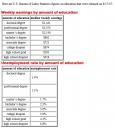Definition in law
From http://afp.google.com/article/ALeqM5g_44VfwUR-TNXE2u-5YXjkX4h4cA
WASHINGTON (AFP) — A child born in a test tube and implanted in his mother’s womb after his father’s death cannot necessarily be considered as an heir to his father’s property, an Arkansas court has ruled.
The state supreme court of Arkansas last week addressed a complaint from Amy Finley, who had applied for child insurance benefits based on her late husband’s earnings but was denied by state authorities.
A central question before the court of Arkansas was whether the date of conception for her child should be considered when the embryo was created or when the embryo was implanted in the mother’s womb.
Married in 1990 but unable to have children, Amy and Wade Finley opted for in vitro fertilization, which produced several embryos in June 2001. Two embryos were implanted in Amy Finley’s womb and she later had a miscarriage.
The following month, Wade Finley died. In June 2002, Amy Finley had two frozen embryos from her late husband thawed and implanted. She gave birth nine months later.
But when she applied for child insurance benefits, Arkansas social service officials denied her request, saying the child was “conceived” after the father had died.
The Arkansas social security administration argued that “conception” was defined as the onset of pregnancy or the implantation of an embryo in the womb.
Amy Finley, however, maintained that her child was “‘conceived’ at the time her egg was fertilized by the father’s sperm,” court papers said.
The court refused Finley’s complaint, saying there was no explicit basis in state law to support her argument.
The justices said the law on inheritance did not address in vitro fertilization and was adopted before the procedure was developed.
But the court declined to offer a legal definition of conception, saying that was “not our role.”
“Were we to define the term ‘conceive,’ we would be making a determination that would implicate many public policy concerns, including, but certainly not limited to, the finality of estates,” the court said in its decision. Instead, it urged the state legislature to address the question.
